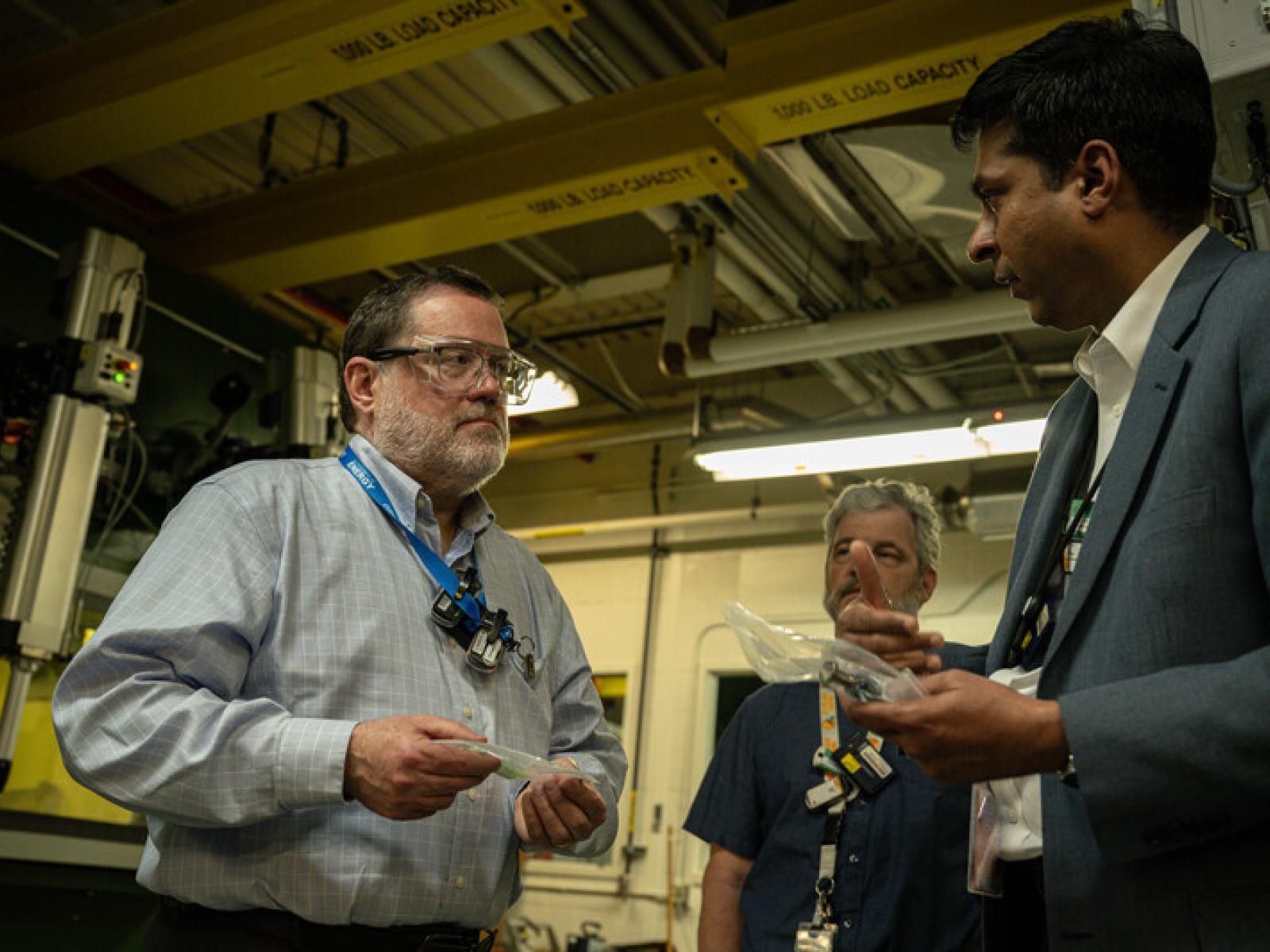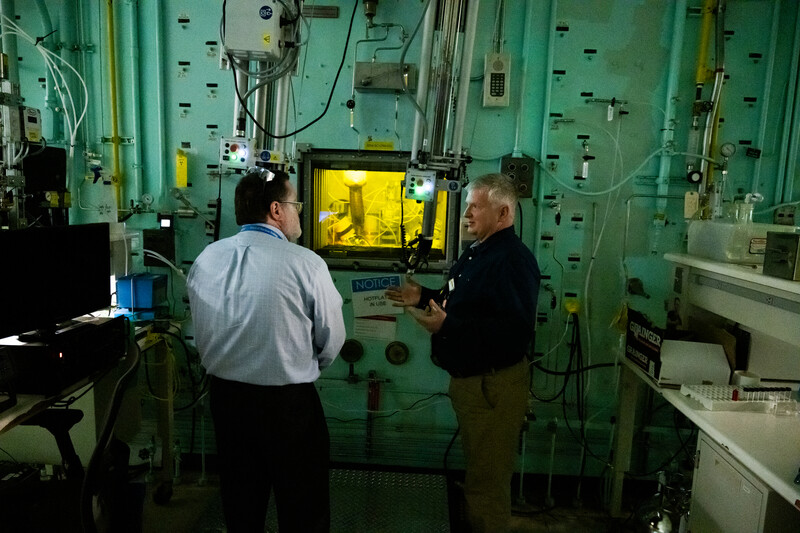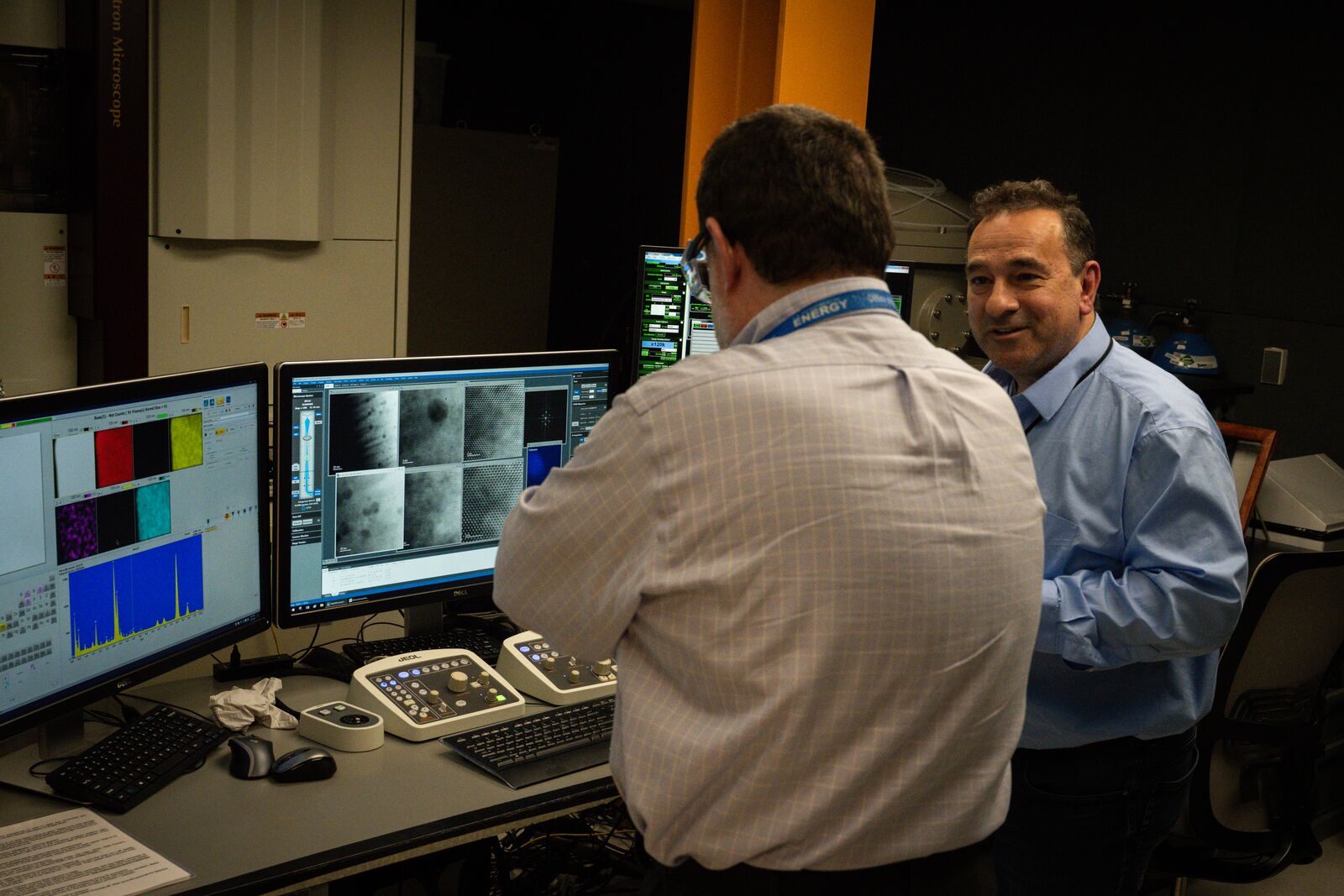DOE Nuclear Energy Leader Michael Goff Visits PNNL
Department of Energy Office of Nuclear Energy acting assistant secretary makes first visit to a national laboratory in new role

Dr. Michael Goff (left), acting assistant secretary for the DOE Office of Nuclear Energy, inspects a sample of cladding for nuclear fuel while PNNL materials scientists Ramprashad Prabhakanan (right) and Stuart Maloy (center) talk about the techniques and data used to compare the mechanical properties of potential cladding materials, both before and after the materials are irradiated.
(Photo by Graham Bourque | Pacific Northwest National Laboratory)
Pacific Northwest National Laboratory (PNNL) welcomed Dr. Michael Goff, PhD, from the Department of Energy (DOE) Office of Nuclear Energy for his inaugural visit to a DOE national laboratory in his new role as acting assistant secretary.
“Our nation's national laboratories house unmatched capabilities and expertise that are crucial to our clean energy future,” said Goff. “It’s always a treat to visit those facilities and hear about the latest breakthroughs and technologies advancements to get us one step closer to achieving net-zero emissions by 2050.”
Dr. Goff toured the Radiochemical Processing Laboratory (RPL), a Hazard Category II non-reactor nuclear research facility that has assisted the nation with critical mission needs in nuclear sciences since 1953. Multifaceted research conducted in the facility promotes reactor safety, improves and expands radioactive waste clean-up efforts, and advances nuclear nonproliferation technology.

PNNL's Associate Laboratory Director Jud Virden and Nuclear Energy Program Development Manager Mark Nutt presented an overview of PNNL’s energy and environment portfolio and nuclear energy research.
“We are grateful that Dr. Goff was able to visit PNNL and tour our Radiochemical Processing Laboratory,” said Virden, who leads the Energy and Environment Directorate. “He was able to meet our staff and see firsthand how our capabilities support nuclear fuel cycle research and advance the mission of DOE’s Office of Nuclear Energy.”
As part of the RPL tour, Dr. Goff was briefed on PNNL’s role in examining irradiated reactor fuels. Under the DOE High Burnup Fuel Project, researchers at PNNL are measuring the mechanical properties of irradiated fuel to support the extended dry storage of spent nuclear fuel. Dr. Goff toured the High-Level Radiochemistry Facility where part of this project is taking place. The project is enabling nuclear utilities to extend the licenses for independent spent fuel storage installations and for the licensing of a consolidated interim storage facility. Goff also learned more about PNNL research on advanced reactor materials and competency in plutonium nonproliferation.
Goff explored RPL’s modular hot cells and walk-in fume hoods and learned about ways PNNL is supporting and partnering with the nuclear energy industry to understand the mechanical performance of materials intended to be used for advanced reactor fuels.

The RPL and PNNL’s Materials Science and Technology Laboratory are Nuclear Science User Facilities (NSUFs). PNNL takes an active role in NSUF projects to better understand the properties of materials that can be used in advanced reactor deployments. Goff was provided an overview of NSUF projects advancing DOE-NE mission, such as the recent NSUF award for PNNL to analyze the mechanical properties of certain types of steel when exposed to the extreme environments in advanced reactors.
The day wrapped up with a visit to RPL’s radiological microscopy suite. Also known as the “Quiet Suite” because it is shielded from factors including noise and vibrations, this world-class characterization facility enables fast transfer of high radioactive materials to answer specific material science questions quickly and efficiently.

Researchers use the Quiet Suite to conduct microscopy on radioactive materials in different environments at a very high resolution. One such project is uranium dioxide degradation in a repository environment, which informs performance assessment modeling to determine how fast spent fuel degrades. Quiet Suite capabilities also allow for detailed examination of irradiated materials and fuels.
“We thank Dr. Goff for taking the time to visit PNNL and the RPL,” Nutt said. “We are proud to be using our unique capabilities to contribute to sustaining nuclear energy as a carbon-free generation source.”
Dr. Goff became the acting assistant secretary on May 4, 2024, after Assistant Secretary Katy Huff returned to her professorship at the University of Illinois at Urbana-Champaign. Dr. Goff also maintains his role as the DOE-NE principal deputy assistant secretary. His May 7 visit to the Tri-Cities, Washington, included speaking at the Energy Communities Alliance Forum of nuclear energy leaders and stakeholders.
Published: May 28, 2024